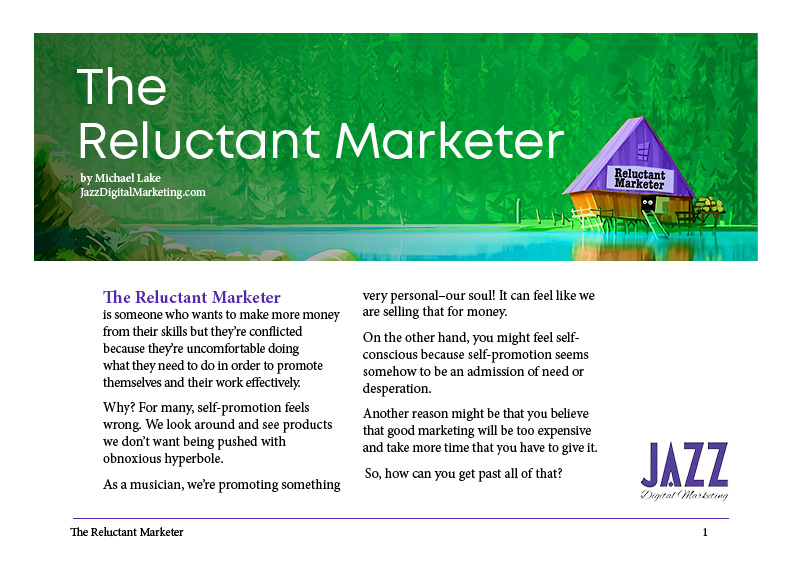We all know Nike’s famous tagline: JUST DO IT.
For me, that phrase is a call to arms. It says, whatever it takes, accomplish your objective, do it within the prescribed time frame, and accept no possibility for failure.
I believe that we all have superpowers, although too many people don’t know what theirs is. Mine is getting stuff done regardless of timeframe while meeting the quality demanded of the job. But this post is not about me. It is about all those who find it difficult to accomplish short or long-term tasks.
What is your collection of half-finished projects, tasks that drag on forever, or dreams that never saw the light of day? You actually can deliver on that project of dream, so let me offer some advice that could help you launch that rocket ship.
I have observed a wide variety of people throughout my long music and business careers. Of those who chronically fail to deliver on time or not at all, I see three main categories: 1. Those who won’t deliver until it is perfect, 2. Those who are paralyzed by fear failure should they ever deliver their project, (“what will people think?”) and 3. those who are unwilling to do the required hard or unpleasant work. If you collect unfinished work or tasks that go far beyond the deadline, which are you (one or more)?
1. The Perfectionist
Was the first iPhone perfect? Far from it. There was no 3G connectivity which was included in many other phones. There were no third-party apps available at the time. The battery was fixed where other phones had removable batteries for replacement. But I believe the iPhone ended up being quite popular!
Was Microsoft Windows perfect when it launched? Far from it, and was plagued with bugs and was overly complicated to use for several more releases. Remember Windows Vista?
The Tesla Model S had misaligned body parts and electrical problems. The touch screen would often freeze or fail, the wall charges overheated, accidents caused fires in the batteries, the retractible door handles would freeze and not present themselves.
In the end, Tesla has sold over five million cars. And they are still not perfect when you look at the current state of their self-driving cars.
Repeat after me: “Perfect is the enemy of good.” That means that for every month or year you are chasing after perfect, you were preventing yourself from delivering something good that pleased your listening audience or buying public. And, by the way, by releasing something imperfect, you could have been learning from experience, how to make it better, just like all the examples I gave above.
My advice is to take a hard look at the state of your project as it is right now and ask yourself (or a friend for advice) is it at least good enough to put into people’s hands (or ears)? If your honest answer is, “Yes, but I can make it better”, take a deep breath, release it now with its imperfections, and continue to work on it.
2. The Failure Avoider
Look back above to the examples I gave of imperfect product launches. Back to Tesla and Elon Musk, he would have never achieved the success of SpaceX if he was afraid of failing to bring back to earth the boosters of his first rockets. Those first ones crashed, exploded, tipped over, or simply bobbed in the ocean. Elon is certainly not afraid of failure.
When you begin something new, you will make mistakes and possibly fail on your first few attempts. But that is a necessary step that cannot be avoided unless of course you are determined to achieve perfection your first time out (see point #1 above).
Ask and answer: “What is the worst thing that could happen if I fail at this?” I assume you are not considering brain transplants, although as examples of imperfection, those early heart, lung, and other transplants failed after a short time. But thanks to the brave men and women who volunteered for those early failed attempts, thousands are now living much longer.
Create that list of worst case outcomes. Look in the mirror and ask yourself if you can withstand a bit of embarrassment if something doesn’t work out exactly as intended. Here’s a secret: most people will be envious that you even tried since they are too afraid or unwilling to do the hard work of finishing! And that brings us to:
3. The hard work avoider
This is the affliction I least relate to. In fact, I sometimes do things in a way that is harder than they need to be. I guess my first instinct is just to plunge into the cold water and then figure out how to swim.
I’m not advocating for that, but I am suggesting that nothing of much value was accomplished without some sweat and pain.
This is a difficult affliction to counsel you through since avoidance of hard work is somewhat hardcoded into our brain. The brain tries to create efficiencies and shortcuts. That’s why we can effortlessly make our way through familiar neighborhoods or buildings without having to remember where every street, corner, or hallway is each time. We encode habits in order to preserve energy.
Something that could help is for you to be clear on why you want to accomplish something. Why do you want to record a new album or arrange a new piece of music? Being clear on the why and all the anticipated benefits can help you overlook the perceived pain and work the project will require.
Think of the mother about to deliver a child. It’s been said that childbirth is one of the most painful activities we can experience. You would think that after having one child, all women would refuse to experience it again. I think part of the reason women repeat the process is the anticipation of the love for their new born child. That’s their why.









1 thought on “How to get stuff done”
my pops had a great line that i use almost every day ,,it was
DO IT NOW !! changed my life !! as in
dirty dishes
finish the tune
exercise